

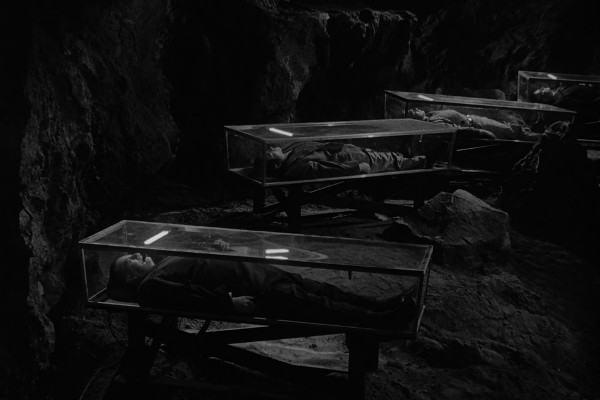
This probably just edges out Showdown with Rance McGrew and Hocus-Pocus and Frisby as the worst title for an episode in the entire series. (I personally think that The Brain Center at Whipple's has something). The episode itself is better in a fun way, but this is now the series as throwaway pulp SF, rather than a seriously-written series with a point to make. A group of gold-stealing criminals use suspended animation technology to lie low, reawakening a hundred years in the future. There's a few logical inconsistencies (such as one of their number claiming to have taken all the gold he can carry, but then bartering for more) and the "twist" ending is pretty obvious, but it manages to rise above them in watchability. Ultimately, while entertaining, this episode is one that talks down to its audience, rather than respecting its intelligence.

An usually bleak episode by the standards of the early series, and also very reminiscent of season five's nihilistic I Am the Night - Color Me Black. However, while the season five story had some passion, Dust can be a little flat. Commendably it looks at prejudice against a minority and also at the nature of forgiveness. However, the dust of the title - a magic dust that can conjure up love - is a little too obscure to really connect, especially as the seller of said dust openly admits it's phony. Ultimately this is passable viewing, but unlikely to be in anyone's list of the most memorable episodes.
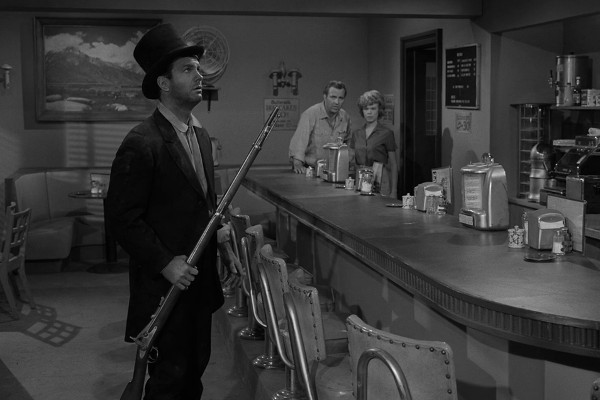
A fairly middling episode where a man from the 1800s manages to find his way to 1961 and discover all the things he needs to set his son's destiny on the right course. It's fairly by-the-numbers stuff, though all concerned play their parts with conviction, and the scenery, all wide-open deserts, looks fantastic. It's also a story which gives a sad commentary on Imperialism, however unintentionally, where a man from the 1800s asks modern day civilians where the Indians are. "We don't have any Indians" comes the reply.
Most dismaying sight of the episode comes with the post-story teaser for the following week's story, which sees Rod Serling having to plug Oasis Cigarettes. While this will be looked at in slightly more depth for the entry on Will the Real Martian Please Stand Up?, it's notable that it begins here, and Rod plugging Oasis can be seen in the large image at the top of this page, in a shot which comes from The Rip Van Winkle Caper.
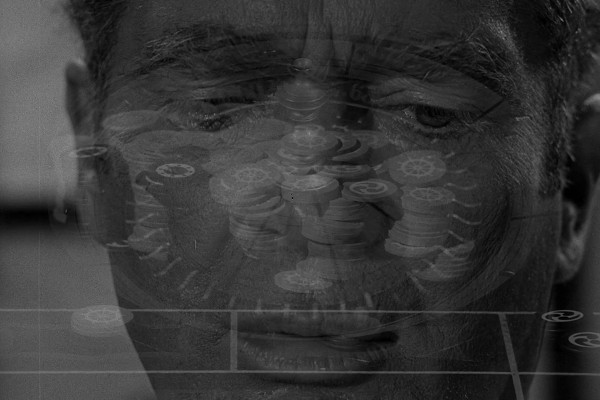
Dane Clark stars as a losing gambler, down on his luck and not able to afford a wedding to his girlfriend. His luck changes when he discovers his friend Jimbo (Buddy Ebsen) has the power of telekinesis and uses his friend's gift to cheat at gambling. He becomes incredibly rich, but when he starts to get out of control, Jimbo realises he needs to teach his friend a lesson for his own good...
Written by Charles Beaumont, the episode is light without ever being an out-and-out comedy, and even though the feats of "telekinesis" are achieved with very obvious wires, the three main characters in the piece are essentially likeable despite their flaws, and it's a charming instalment. The director is Richard L. Bare, who went on to direct Buddy Ebsen in almost every episode of sitcom Green Acres.
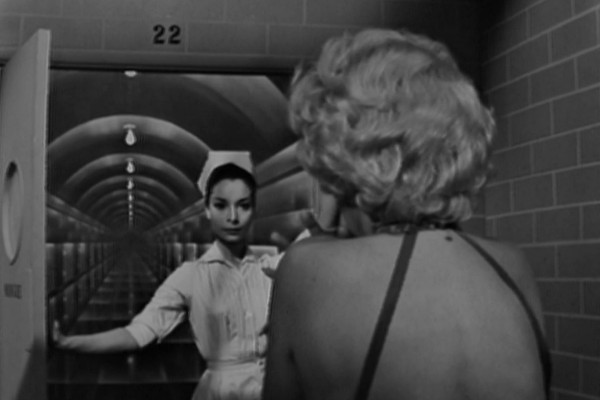
In 1906 the writer Edward Frederic Benson wrote a short story about premonition titled "The Bus-Conductor". In 1944 the story was adapted both as part of the classic portmanteau horror film Dead of Night, and as an anecdote in the book Famous Ghost Stories. It's this latter appearance that Rod Serling took as the basis of this videotaped episode, with a female character in the central role who foresees her own death.
As the fifth episode to be videotaped, it's a pleasing coincidence that it features a role for Jonathan Harris, while the final videotaped episode showcased Billy Mumy... both of whom, of course, would go on to have a very successful partnership in the science fantasy series Lost In Space. Sadly, however, Harris and lead Barbara Nichols opt for some eccentric acting choices which distract from a simple yet great premise. Like an episode from the 80s revival series, Button, Button, what could have been a great horror is made more camply comic in the unusual hands present. Look out also for the lady in the airport with a table lamp(!) who silently turns and walks away when it's broken... all things which add to a sense of unreality, and not in a good way.
Director Jack Smight had directed season one's The Lonely, as well as two of the other videotaped episodes from season two (The Lateness of the Hour/The Night of the Meek), but the multi-camera set up seems an ill-fit for the show, with many microphone shadows and lurching cameras. This said, in this case it's something of a virtue in this instance, as it lends the episode a dreamlike quality it perhaps wouldn't have been afforded on film.
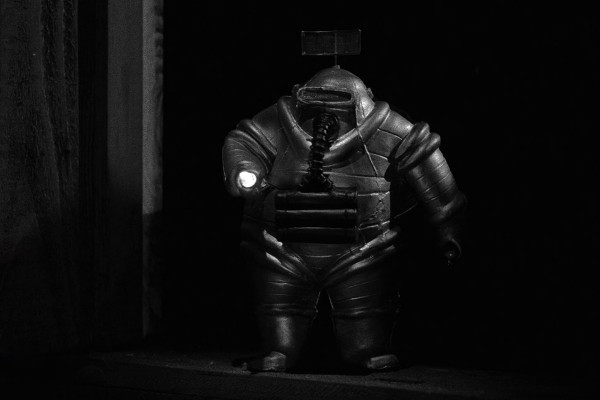
The definition of an episode being "overrated" is, of course, a purely subjective one; one person's opinion against a sizeable majority's. However, while most of the accepted "classics" of the series are held up here, there are three particular episodes which are generally highly regarded by fans of the series but will not be so praised in these rankings: The Eye of the Beholder and season five's Nightmare at 20,000 Feet will come in for criticism, along with, here, The Invaders.
The Invaders is one of two Richard Matheson scripts for the season (the other being the classic Nick of Time) and is, to its credit, a commendable experiment. Featuring small alien invaders inside a desolate shack, almost the entire duration is dialogue-free, Agnes Moorhead only allowing groans and gasps to punctuate her reactions as she looks for safety. There's dialogue at the end, which includes a major twist, but for the majority of the episode it's a piece that dares to be different.
Sadly, it's pretty empty stuff, thematically. The central concept is pulp SF - well done pulp SF, but pulp SF all the same - and it's an episode without anything to say. Not that episodes should be entirely rated by their ability to comment on the human condition, but this contains a narrative that takes minimalism to a new level. It's not that The Invaders is bad... it's just that when it's so highly lauded (Time Magazine once listed it as one of the ten greatest episodes) it's hard not to view it all as a little hollow.
Lastly, in terms of trivia, then look out for Rod having a crafty fag (or cigarette for any American readers) during his introduction... one of six times he'd do so during season two. His post-story teasers were even worse, with eight of them seeing Rod lighting up.